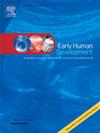嗅通蛋白4基因多态性对脓毒症早产儿的保护作用
IF 2
3区 医学
Q2 OBSTETRICS & GYNECOLOGY
引用次数: 0
摘要
dolfactomedin 4 (OLFM4)基因多态性与炎症反应的变化和感染的严重程度有关。本研究旨在探讨OLFM4单核苷酸多态性rs17552047和rs1891944与早产儿脓毒症严重结局的关系。方法于2023年4月至2024年4月对所有诊断为新生儿脓毒症的早产儿进行前瞻性观察队列研究。使用实时聚合酶链反应进行基因分型,并通过多变量logistic回归和生存分析,使用遗传模型(显性、隐性和加性)分析与严重结局的关联。结果174例早产新生儿中,39例出现严重后果。SNP rs17552047的AA/AG基因型和rs1891944的TT/TC基因型与严重结局风险降低相关(校正风险比:0.271,95%可信区间[CI]: 0.115-0.641, p = 0.003;校正风险比:0.349,95% CI: 0.175-0.698, p = 0.003)。每增加一个A等位基因,严重结局的几率降低65% (95% CI: 0.15-0.78, p = 0.01)。结合snp和临床变量的模型具有良好的预测能力(受试者工作特征曲线下面积:0.826,95% CI: 0.748 ~ 0.903, p = 0.03)。结论OLFM4 rs17552047 AA/AG和rs1891944 TT/TC基因型与新生儿脓毒症的预后相关。这些snp有望预测新生儿败血症的严重后果。本文章由计算机程序翻译,如有差异,请以英文原文为准。
Protective role of olfactomedin 4 gene polymorphisms in preterm neonates with sepsis
Background
Olfactomedin 4 (OLFM4) gene polymorphisms have been associated with variations in inflammatory responses and the severity of infections. This study aimed to investigate the association between OLFM4 single nucleotide polymorphisms (SNPs) rs17552047 and rs1891944 and severe outcomes in preterm neonatal sepsis.
Methods
A prospective observational cohort study was conducted from April 2023 to April 2024, involving all preterm infants diagnosed with neonatal sepsis. Genotyping was performed using real-time polymerase chain reaction, and the associations with severe outcomes were analyzed using genetic models (dominant, recessive, and additive) through multivariate logistic regression and survival analysis.
Results
Among the 174 preterm newborns included in the study, 39 experienced severe outcomes. The AA/AG genotypes of SNP rs17552047 and TT/TC genotypes of rs1891944 were associated with a reduced risk of severe outcomes (adjusted hazard ratio: 0.271, 95 % confidence interval [CI]: 0.115–0.641, p = 0.003, and adjusted hazard ratio: 0.349, 95 % CI: 0.175–0.698, p = 0.003, respectively). The odds of severe outcomes decreased by 65 % for each additional A allele (95 % CI: 0.15–0.78, p = 0.01). The model incorporating both SNPs and clinical variables demonstrated good predictive capability (area under the receiver operating characteristic curve: 0.826, 95 % CI: 0.748–0.903, p = 0.03).
Conclusions
The OLFM4 rs17552047 AA/AG and rs1891944 TT/TC genotypes have been linked to favorable outcomes in neonatal sepsis. These SNPs hold promise for predicting severe outcomes in neonatal sepsis.
求助全文
通过发布文献求助,成功后即可免费获取论文全文。
去求助
来源期刊

Early human development
医学-妇产科学
CiteScore
4.40
自引率
4.00%
发文量
100
审稿时长
46 days
期刊介绍:
Established as an authoritative, highly cited voice on early human development, Early Human Development provides a unique opportunity for researchers and clinicians to bridge the communication gap between disciplines. Creating a forum for the productive exchange of ideas concerning early human growth and development, the journal publishes original research and clinical papers with particular emphasis on the continuum between fetal life and the perinatal period; aspects of postnatal growth influenced by early events; and the safeguarding of the quality of human survival.
The first comprehensive and interdisciplinary journal in this area of growing importance, Early Human Development offers pertinent contributions to the following subject areas:
Fetology; perinatology; pediatrics; growth and development; obstetrics; reproduction and fertility; epidemiology; behavioural sciences; nutrition and metabolism; teratology; neurology; brain biology; developmental psychology and screening.
 求助内容:
求助内容: 应助结果提醒方式:
应助结果提醒方式:


